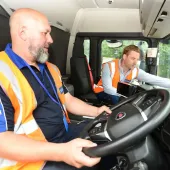No excuse for concealing excessive driving hours

Regulator calls on operators and transport managers to be vigilant over drivers using more than one card
TRAFFIC Commissioner Nick Denton has reminded operators and transport managers of the need to be extra vigilant for drivers who are using more than one card to hide excessive driving.
The London and South East regulator is also warning professional drivers that they will face significant action against their vocational licences if they use more than one driver card.
His comments come after conduct hearings in Eastbourne last month where a number of drivers were reported for using two driver cards to conceal excessive driving – which the regulator described as ‘truly frightening’ in one case.
Three drivers were disqualified from professional driving for 12 months and a further two drivers received six-month disqualifications.
The Traffic Commissioner also suspended the vocational licences of two other drivers because they failed to attend conduct hearings.
Mr Denton said that, shockingly, one driver was also the sole director and transport manager of a transport company. As a result, his company’s operator licence has been revoked and he has been disqualified from holding a licence and from being a transport manager for five years.
Worryingly for the quarrying industry, Mr Denton also dealt with drivers committing similar offences for other companies – mainly subcontractors in the tarmac and aggregates sector.
One driver used two cards to make 17 false records between February and March 2015. He drove double shifts, typically taking a daily rest of between four and six hours – far short of the minimum nine.
Another driver used two cards to make 13 false records between January and March 2015. He drove double shifts, on one occasion taking only 17 minutes rest between an 11.5-hour night shift and starting a day shift that was to last for a further nine hours.
Describing this behaviour as an attempt to conceal ‘truly frightening levels’ of lack of daily rest, Mr Denton said these cases acted as a stark reminder to operators, transport managers and drivers of their professional, licence and road safety responsibilities.
‘Falsifying the record by using two cards is a serious offence,’ he said. ‘Such conduct undermines the entire point of the rules on tachographs and drivers’ hours, which is to enable employers and enforcement authorities to have a true record of a person’s driving, other work and rest periods, so that it can be established that drivers have not worked excessive hours and driven while tired.
‘If drivers flout the rules by driving excessive hours, road safety can be severely jeopardized.’
In these particular cases, drivers typically reported a tachograph card lost or stolen, received a replacement from the DVLA and then, with two cards in their possession, would use one to drive a day shift for one operator and the other to drive a night shift for another operator.
Mr Denton remarked: ‘It is clear from the pattern of offending in this investigation that operators and transport managers face difficulties in identifying drivers who are using multiple cards, particularly to work for more than one employer.
‘That’s why it is important to regularly check the digital tachograph cards that drivers are using. The driver cards have an index number, the last two digits of which change if the driver is issued with a new card.
‘While there will be many legitimate instances where a card is lost or stolen and a new card is required by the driver, operators and transport managers should look out for drivers who are using cards with different index numbers within the same employment.
‘If cards with different index numbers are used in similar periods – and the driver has not reported to you that their card was lost or stolen – this may also be an indication that two cards could be in use at the same time,’ said Mr Denton.









